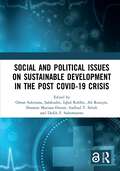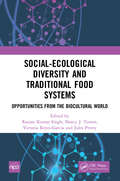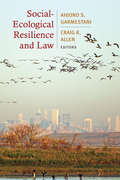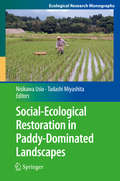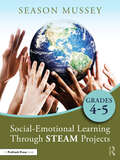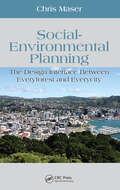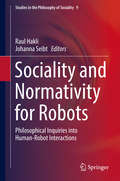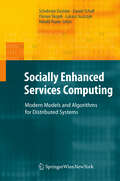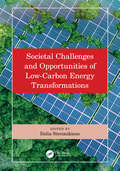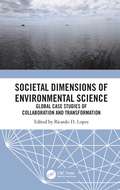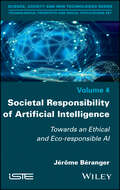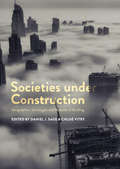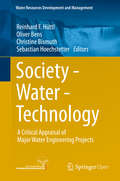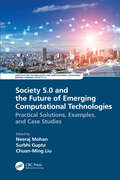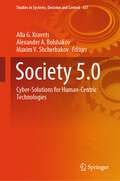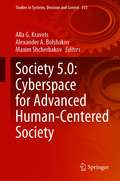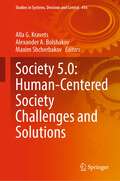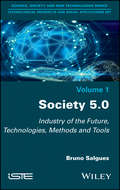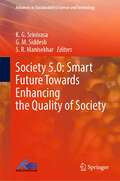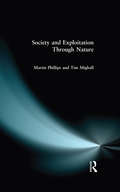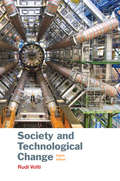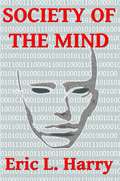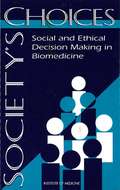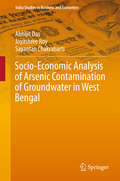- Table View
- List View
Social and Political Issues on Sustainable Development in the Post Covid-19 Crisis: Proceedings of the International Conference on Social and Political Issues on Sustainable Development in the Post Covid-19 Crisis (ICHSOS 2021), Malang, Indonesia, 18-19 June 2021
by Oman SukmanaAs a threat, a pandemic has indirect implications for social, economic and political conditions both at domestic and international levels. Thus, collective and comprehensive efforts are needed in responding to and preventing the expansion of infections caused by the virus, including Covid-19. This international conference provides the discourse on social, economic as well as political issues regarding the condition after the pandemic. Social issues are studied through social welfare, sociology, governance, communication and international relations approaches. Meanwhile, economic problems are discussed through business, economic development and economic management approaches. Under the First International Conference on Humanities and Social Sciences (ICHSOS) 2021, speakers from several countries provided solutions and alternative perspectives in preventing and dealing with problems after the Covid-19 pandemic. This book contains 42 papers presented at the conference.
Social-Behavioral Modeling for Complex Systems (Stevens Institute Series on Complex Systems and Enterprises)
by Paul K. Davis Angela O'Mahony Jonathan PfautzThis volume describes frontiers in social-behavioral modeling for contexts as diverse as national security, health, and on-line social gaming. Recent scientific and technological advances have created exciting opportunities for such improvements. However, the book also identifies crucial scientific, ethical, and cultural challenges to be met if social-behavioral modeling is to achieve its potential. Doing so will require new methods, data sources, and technology. The volume discusses these, including those needed to achieve and maintain high standards of ethics and privacy. The result should be a new generation of modeling that will advance science and, separately, aid decision-making on major social and security-related subjects despite the myriad uncertainties and complexities of social phenomena. Intended to be relatively comprehensive in scope, the volume balances theory-driven, data-driven, and hybrid approaches. The latter may be rapidly iterative, as when artificial-intelligence methods are coupled with theory-driven insights to build models that are sound, comprehensible and usable in new situations. With the intent of being a milestone document that sketches a research agenda for the next decade, the volume draws on the wisdom, ideas and suggestions of many noted researchers who draw in turn from anthropology, communications, complexity science, computer science, defense planning, economics, engineering, health systems, medicine, neuroscience, physics, political science, psychology, public policy and sociology. In brief, the volume discusses: Cutting-edge challenges and opportunities in modeling for social and behavioral science Special requirements for achieving high standards of privacy and ethics New approaches for developing theory while exploiting both empirical and computational data Issues of reproducibility, communication, explanation, and validation Special requirements for models intended to inform decision making about complex social systems
Social-Ecological Diversity and Traditional Food Systems: Opportunities from the Biocultural World
by Ranjay Kumar Singh, Nancy J. Turner, Victoria Reyes-Garcia and Jules PrettyThis book draws on world-wide experiences and valuable lessons to highlight community-ecosystem interactions and the role of traditional knowledge in sustaining biocultural resources through community-based adaptations. The book targets different audiences including researchers working on human-environment interactions and climate adaptation practices, biodiversity conservators, non-government organizations and policy makers involved in revitalizing traditional foods and community-based conservation and adaptation in diverse ecosystems. This volume is also a source book for educators advocating for and collaborating with indigenous and local peoples to promote location-specific adaptations to overcome the impacts of multiple biotic and abiotic stresses.Note: T&F does not sell or distribute the hardback in India, Pakistan, Nepal, Bhutan, Bangladesh and Sri Lanka. This title is co-published with NIPA.
Social-Ecological Resilience and Law
by Craig Allen Ahjond GarmestaniEnvironmental law envisions ecological systems as existing in an equilibrium state, reinforcing a rigid legal framework unable to absorb rapid environmental changes and innovations in sustainability. For the past four decades, "resilience theory," which embraces uncertainty and nonlinear dynamics in complex adaptive systems, has provided a robust, invaluable foundation for sound environmental management. Reforming American law to incorporate this knowledge is the key to sustainability. This volume features top legal and resilience scholars speaking on resilience theory and its legal applications to climate change, biodiversity, national parks, and water law.
Social-Ecological Restoration in Paddy-Dominated Landscapes
by Nisikawa Usio Tadashi MiyashitaWith a focus on environmentally friendly rice farming, this unique book integrates both ecosystem and human dimensions of ecological restoration to provide strategies to promote sustainable agriculture and rural development. Paddy fields have multiple functions beyond their role of producing rice: They serve as refuge habitats for a range of wildlife that once inhabited floodplain wetlands and contain a number of unique and threatened aquatic species. They also provide various ecosystem services for regional communities such as water retention, erosion control, flood control, fish culture, and educational opportunities. However, rice paddies are threatened worldwide due to the modernization of agriculture and abandonment of farmland caused by depopulation and the aging of rural communities. Therefore, multiple ecological and sociological aspects must be considered in the ecological restoration of paddy fields. This book aims to do so by incorporating various disciplines of natural and social sciences. Strategies for sustainable agriculture are reviewed, including financial incentives for farmers and the use of flagship wildlife species such as the crested ibis (toki) to promote ecological restoration. With the increasing popularity of environmentally friendly rice farming in parts of Asia and the western United States, this book offers model cases for sustainable management of paddy-dominated landscapes.
Social-Emotional Learning Through STEAM Projects, Grades 4-5
by Season MusseySocial-Emotional Learning Through STEAM Projects, Grades 4–5 helps educators target the development of social and emotional learning (SEL) competencies for high-ability learners through interdisciplinary, project-based inquiry. Aligned with STEAM content standards, each of the nine projects introduces students to a real-world problem through essential questions and the presentation of a primary source document. Both the content and the inquiry process support SEL competency development, from self-awareness to selfmanagement, social awareness, relationship skills, and responsible decision-making. As students work to understand and pose solutions to each problem, they gain the knowledge and practical skills needed to become more socially and emotionally competent individuals in their classroom communities.
Social-Environmental Planning: The Design Interface Between Everyforest and Everycity (Social Environmental Sustainability)
by Chris MaserWith the environment, climate change, and global warming taking center stage in the national debate, the issues seem insurmountable and certainly unsolvable at the local level. Written by Chris Maser, international consultant on forest ecology, sustainable forestry practices, and sustainable development, Social-Environmental Planning: The Design In
Sociality and Normativity for Robots
by Johanna Seibt Raul HakliThis volume offers eleven philosophical investigations into our future relations with social robots--robots that are specially designed to engage and connect with human beings. The contributors present cutting edge research that examines whether, and on which terms, robots can become members of human societies. Can our relations to robots be said to be "social"? Can robots enter into normative relationships with human beings? How will human social relations change when we interact with robots at work and at home? The authors of this volume explore these questions from the perspective of philosophy, cognitive science, psychology, and robotics. The first three chapters offer a taxonomy for the classification of simulated social interactions, investigate whether human social interactions with robots can be genuine, and discuss the significance of social relations for the formation of human individuality. Subsequent chapters clarify whether robots could be said to actually follow social norms, whether they could live up to the social meaning of care in caregiving professions, and how we will need to program robots so that they can negotiate the conventions of human social space and collaborate with humans. Can we perform joint actions with robots, where both sides need to honour commitments, and how will such new commitments and practices change our regional cultures? The authors connect research in social robotics and empirical studies in Human-Robot Interaction to recent debates in social ontology, social cognition, as well as ethics and philosophy of technology. The book is a response to the challenge that social robotics presents for our traditional conceptions of social interaction, which presuppose such essential capacities as consciousness, intentionality, agency, and normative understanding. The authors develop insightful answers along new interdisciplinary pathways in "robophilosophy," a new research area that will help us to shape the "robot revolution," the distinctive technological change of the beginning 21st century.
Socially Enhanced Services Computing
by Daniel Schall Schahram Dustdar Florian Skopik Lukasz Juszczyk Harald PsaierSocially enhanced Services Computing deals with a novel and exciting new field at the intersection between Social Computing, Service-oriented Computing, Crowd Computing, and Cloud Computing. The present work presents a collection of selected papers by the editors of this volume, which they feel will help the reader in understanding this field. The approach discussed allows for a seamless integration of people into trusted dynamic compositions of Human-provided Services and Software-based services, thus empowering new interaction models and processes in massive collaboration scenarios in a Future Internet.
Societal Challenges and Opportunities of Low-Carbon Energy Transformations
by Dalia StreimikieneLow-carbon energy transformations to support carbon-neutral societies is an important and urgent topic and subject to current national priorities and socio-economic planning. This book addresses the societal challenges and opportunities that come with the transition in EU member states such as energy poverty and inequality, energy security, gender inequality, energy efficiency improvements, climate change mitigation, growth in green investments, etc. It contains a balanced approach of theoretical concepts with an impressive range of relevant case studies to investigate the issues, develop indicator frameworks, identify barriers and drivers, and create policies and measures to unlock opportunities.Features: Addresses systematically and comprehensively the low-carbon energy transition, its barriers, and its societal implications. Discusses the main societal challenges and opportunities of low-carbon energy transition from theoretical and practical points of view. Provides definitions of concepts, measurement indicators, policies, and a framework for overcoming barriers and enforcing drivers. Includes case studies on low-carbon energy transition challenges and opportunities that are developed for EU countries. Encourages discussion on policies and measures necessary to overcome identified barriers and proposes how to promote a just and smooth low-carbon energy transition. This book is a great reference for academics, researchers, graduate students, and professionals such as energy producers, city planners, policymakers, etc. interested in current and emerging trends in sustainable energy.
Societal Dimensions of Environmental Science: Global Case Studies of Collaboration and Transformation
by Ricardo D. LopezSocietal Dimensions of Environmental Science: Global Case Studies of Collaboration and Transformation, brings together several key examples of the successes and the challenges that exist for environmental stakeholders trying to strike a balance between science and the societal implications of the issues involved. This book provides important methods and approaches necessary for informed decision making and a better understanding of the common threads of learning, collaboration, negotiation, and compromise. It also explains that concepts and skills needed to better understand how specific project goals can be best achieved in the rapidly changing field of environmental management, by providing practical situations and solutions, across a global landscape. This book provides anyone who works in a community setting with the necessary tools and strategies for solving environmental problems and achieving the goals of an environmental project of any type and specifically addresses the topic of how to synthesize community engagement and the environmental science. It describes current environmental issues and lessons learned of what works and what doesn’t work in real situations, and why. It also highlights key examples, which can be used by both management practitioners and research scientists in their specific circumstances. Showcasing a unique compilation of the diverse and specific examples from societies in Asia, Oceania, North America, and the Middle East, with an equally diverse array of authorship, this book serves all policy makers, scientists, organizers, and community members that desire to build better group dynamics for addressing environmental issues.
Societal Responsibility of Artificial Intelligence: Towards an Ethical and Eco-responsible AI
by Jérôme BérangerThe digital world is characterized by its immediacy, its density of information and its omnipresence, in contrast to the concrete world. Significant changes will occur in our society as AI becomes integrated into many aspects of our lives. This book focuses on this vision of universalization by dealing with the development and framework of AI applicable to all. It develops a moral framework based on a neo-Darwinian approach - the concept of Ethics by Evolution - to accompany AI by observing a certain number of requirements, recommendations and rules at each stage of design, implementation and use. The societal responsibility of artificial intelligence is an essential step towards ethical, eco-responsible and trustworthy AI, aiming to protect and serve people and the common good in a beneficial way.
Societies under Construction: Geographies, Sociologies and Histories of Building
by Daniel J. Sage Chloé VitryThis edited collection explores building construction as an inspiring, yet often overlooked, place to develop new knowledge about the development of human societies. Eschewing dominant engineering and management perspectives on construction, the book is purposefully broad in its scope, both empirically and theoretically, as reflecting the rich underexplored potential of studies of building construction to inform a wide span of intellectual debates across the social science and humanities. The seven chapters encompass contributions to theories of: spatiotemporal organization with wildlife on building sites; institutional change with building ruins; home with Mexican self-help housing; place with a suburban housing development; socio-materiality with the adaptation of a university library; migrant labour with the Parisian postwar construction boom; and gender with a female site manager in Sweden. This book seeks to develop a new critical sub-area for construction studies that focuses on the actual processes and practices of ‘constructing'. Bringing together diverse members of construction research communities working in a variety of contexts, it develops empirical engagements with building work to challenge its marginalization, relative to architectural studies, to provoke novel understandings of human history, geography and sociology.
Society - Water - Technology
by Reinhard F. Hüttl Oliver Bens Christine Bismuth Sebastian HoechstetterThis book presents the results of the Interdisciplinary Research Group "Society - Water - Technology" of the Berlin-Brandenburg Academy of Sciences and Humanities. It describes interdisciplinary evaluation criteria for major water engineering projects (MWEPs) and portrays an application to the Lower Jordan Valley (Middle East) and the Fergana Valley (Central Asia). Both areas are characterised by transboundary conflicts, by challenges due to demographic and climate change and by political and societal pressures. Based on the findings, the book provides recommendations for science and political decisions makers as well as for international financing institutions. In addition, it outlines research gaps from an interdisciplinary perspective. In the past, MWEPs have been used as an instrument to cope with the demands of growing populations and to enhance development progress. Experiences with MWEPs have shown that a purely technical approach has not always brought about the desired results. In many cases, MWEPs have even resulted in negative implications for society and environment. Therefore, improved management strategies and enhanced technologies for a sustainable water resource management system are a prerequisite to meet present and future challenges. And, moreover, the continuous evaluation and optimisation of these measures is, likewise, a must.
Society 5.0 and the Future of Emerging Computational Technologies: Practical Solutions, Examples, and Case Studies (Demystifying Technologies for Computational Excellence)
by Chuan-Ming Liu Neeraj Mohan Surbhi GuptaThis book discusses the technological aspects for the implementation of Society 5.0. The foundation and recent advances of emerging technologies such as artificial intelligence, data science, Internet of Things, and Big Data for the realization of Society 5.0 are covered. Practical solutions to existing problems, examples, and case studies are also offered. Society 5.0 and the Future of Emerging Computational Technologies: Practical Solutions, Examples, and Case Studies discusses technologies such as machine learning, artificial intelligence, and Internet of Things for the implementation of Society 5.0. It offers a firm foundation and understanding of the recent advancements in various domains such as data analytics, neural networks, computer vision, and robotics, along with practical solutions to existing problems in fields such as healthcare, manufacturing industries, security, and infrastructure management. Applications and implementations are highlighted along with the correlation between technologies. Examples and case studies are presented throughout the book to augment text. This book can be used by research scholars in the engineering domain who wish to gain knowledge and contribute towards a modern and secure future society. The book will also be useful as a reference at universities for postgraduate students who are interested in technological advancements.
Society 5.0: Cyber-Solutions for Human-Centric Technologies (Studies in Systems, Decision and Control #437)
by Alla G. Kravets Alexander A. Bolshakov Maxim V. ShcherbakovThis book focuses on open issues of Society 5.0, a new paradigm of a society, that balances a human-centred approach and technologies based on cyber-physical systems and artificial intelligence. The book contains results of how intelligent or cyber-solutions help to improve the quality of life in society despite new challenges. This book includes five sections. Section Society 5.0: Biomedicine and Healthcare present how cyber-physical systems help in healthcare, e.g. analysis of clinical data in pregnant women with hypertension, breast cancer diagnostics, healthy diet design and others. In the chapter, the problem of data analysis and optimization is considered. The second Section, Society 5.0: Human-centric Cyber-Solutions highlight new findings on constructing virtual reality simulators, training of workers on the basis of equipment's digital twins, development of human capital. Society 5.0: Socio-Economic Systems Modelling includes chapters concerning the application of quantum-like mathematical models for the analysis of socio-economic systems, indicative planning models for agriculture, approaches of assessing and monitoring competitiveness risks of regions. A section, Society 5.0: Industrial Cyber-Solutions provides new results on cyber-physical systems of Russian oil market, railway joint diagnostics, and information support for maintenance and repair of a machine-building cyber-physical system. The last section, Society 5.0: Cyber-Solutions Security consider interoperability issues of security, the video conferencing, and scaling networks.This book is directed to researchers, practitioners, engineers, software developers, professors and students. We do hope the book will be useful for them.
Society 5.0: Cyberspace for Advanced Human-Centered Society (Studies in Systems, Decision and Control #333)
by Maxim Shcherbakov Alla G. Kravets Alexander A. BolshakovThis book includes new findings on socio-economic cyber systems control and development approaches based on AI and data-driven techniques. The authors determine key social challenges and the main features of management and modeling processes. To enhance the efficiency of the socio-economic process, new approaches were suggested as well as its components based on the concept of Society 5.0. In this book, the authors substantiate the scientific, practical, and methodological approaches to the smart technologies’ development. The core is a human-centered concept of cyber systems as well as the intelligent paradigm. Approaches combined both mathematical models and data processing techniques are also proposed as advanced methods for smart system design for ecology and health care. The implementations of the developed prototypes, including testing in real domains, which have collected and analyzed big data and proved their effectiveness, are presented. The target audience of the book are practitioners, enterprise representatives, scientists, and Ph.D. and Master students who perform scientific research or applications of socio-economic cyber systems in different domains.
Society 5.0: Human-Centered Society Challenges and Solutions (Studies in Systems, Decision and Control #416)
by Maxim Shcherbakov Alla G. Kravets Alexander A. BolshakovThis book focuses on open issues of Society 5.0, a new paradigm of a society that balances a human-centred approach and technologies based on cyber-physical systems and artificial intelligence. The book contains results of how intelligent or cyber-physical systems help to improve the quality of life in society despite new challenges. Discusses implemented breakthrough systems, models, programs, and methods that cover the following topics: biomedicine and healthcare, innovations in socio-economic systems, intelligent energetics, advances in transport systems, human-centric technologies. These approaches help to improve human society using cyber-physical systems in a dramatically changing environment. The target audience of the book are practitioners, enterprises representatives, scientists, PhD and Master students who perform scientific research on the application of cyber-physical systems towards Society 5.0.
Society 5.0: Industry of the Future, Technologies, Methods and Tools
by Bruno SalguesFollowing the rapid development of connected technologies, which are now highly sophisticated and spread across the globe, Society 5.0 has emerged and brought with it a dramatic societal shift. In 1998, Kodak, the world leader in photographic film, had 170,000 employees. It thus seemed unthinkable that just 3 years later, the majority of people would stop taking photographs to paper film and that Kodak would have disappeared. These are the stakes of this new society that is taking shape. This book, which does not seek to critique current politics, management or marketing literature, aims to fight against the excesses of this often-misunderstood Society 5.0 and to present the ideas and associated technologies that comprise it, all working towards societal improvement. Among these technologies, artificial intelligence, robotics, digital platforms and 3D printing are undoubtedly the most important, and thus receive the greatest focus.
Society 5.0: Smart Future Towards Enhancing the Quality of Society (Advances in Sustainability Science and Technology)
by K. G. Srinivasa G. M. Siddesh S. R. ManisekharThe book discusses Society 5.0 which fills the gap between cyber and physical space by providing a balanced environment between economic and social needs. The book is divided into two parts; part A focuses on various concepts related to Society 5.0 such as cyber space, physical space, information management and digital transformation. Part B discusses various integrated fields in Society 5.0, such as super-smart healthcare system, super-smart hospitality system, smart building, and transport management system. It also illustrates the concepts of big data, real-time analytics for smart Society 5.0 with an insight of real-time case studies.
Society and Exploitation Through Nature
by Martin Phillips Tim MighallSociety and Exploitation Through Nature offers an integrated approach to the environment, linking the philosophical, social and physical sciences to environmental problems and issues. The text covers three main themes; exploitation of nature and society; the limits of exploitation through sustainability and managing environmental problems. These themes are illustrated throughout the book with global case studies.
Society and Technological Change (Eighth Edition)
by Rudi VoltiSociety and Technological Change is the best text available for undergraduate courses exploring the relationship between societal and technological change Brimming with Rudi Volti's expertise and enthusiasm for its dynamic subject, this always timely volume helps students grasp the vast societal implications of a wide range of technological breakthroughs, both historic and contemporary.
Society of the Mind
by Eric L. HarryIn the year 2003, psychologist Laura Aldridge is offered a million dollars for one week's consulting, by the richest man on Earth. When she lands on the Gray Corporation's South Pacific Island she finds a supertech domain, at the heart of which lies a secret that will affect the future of humanity.
Society's Choices: Social and Ethical Decision Making in Biomedicine
by Harvey V. Feinberg Ruth E. Bulger Elizabeth M. BobbyBreakthroughs in biomedicine often lead to new life-giving treatments but may also raise troubling, even life-and-death, quandaries.Society's Choices discusses ways for people to handle today's bioethics issues in the context of America's unique history and culture--and from the perspectives of various interest groups.The book explores how Americans have grappled with specific aspects of bioethics through commission deliberations, programs by organizations, and other mechanisms and identifies criteria for evaluating the outcomes of these efforts. The committee offers recommendations on the role of government and professional societies, the function of commissions and institutional review boards, and bioethics in health professional education and research.The volume includes a series of 12 superb background papers on public moral discourse, mechanisms for handling social and ethical dilemmas, and other specific areas of controversy by well-known experts Ronald Bayer, Martin Benjamin, Dan W. Brock, Baruch A. Brody, H. Alta Charo, Lawrence Gostin, Bradford H. Gray, Kathi E. Hanna, Elizabeth Heitman, Thomas Nagel, Steven Shapin, and Charles M. Swezey.
Socio-Economic Analysis of Arsenic Contamination of Groundwater in West Bengal
by Abhijit Das Joyashree Roy Sayantan ChakrabortiThis book presents a socio-economic analysis of the issues linking technological innovation in providing arsenic-safe drinking water in rural areas. It presents concrete field based experiences of experiments and case studies depicting the plight and sufferings of people due to failed technological deployment strategies over the past two decades in West Bengal, the most arsenic-exposed state in India and also the first to act for remediation of the crisis. One of the greatest challenges in arsenic-exposed zones is to provide sustainable access to reliably arsenic-safe free water. For nearly twenty years the Government of India and national water distribution institutions in collaboration with multi-lateral funding agencies have sought to pump in money, push technology collected through global tenders, and enlist the support of non-governmental organizations (NGOs), but their efforts have yielded little success. This book is the outcome of the authors' intensive fieldwork, guided by the conceptual framework of the latest literature on environmental economics and consumer behaviour. It presents a framework and estimates based on field level primary data. Secondary official source-based data are also collated from various scattered sources into a valuable, comprehensive collection. Lastly, the book includes a revealing analysis of factors affecting households' participation.
